English actor Sir Alec Guinness (1914–2000) was one of the most versatile and subtle actors of his time, in the cinema and on television no less than on the stage. He was master of disguise in several of the classic Ealing Comedies, including Kind Hearts and Coronets in which he played eight different characters. He later won the Academy Award for Best Actor for his role as Colonel Nicholson in The Bridge on the River Kwai, and he is probably even better known for playing Obi-Wan Kenobi in the original Star Wars trilogy.
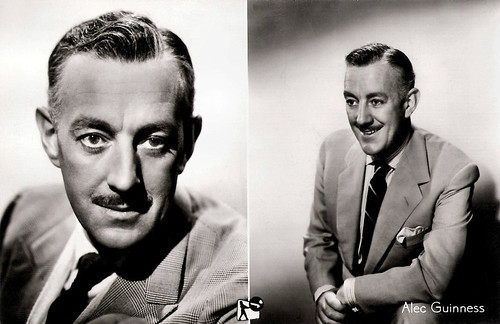
German postcard by Franz Josef Rüdel, Filmpostkartenverlag, Hamburg-Bergedorf, no. D 2367. Photos: J. Arthur Rank-Film. Publicity stills for The Ladykillers (Alexander Mackendrick, 1955).
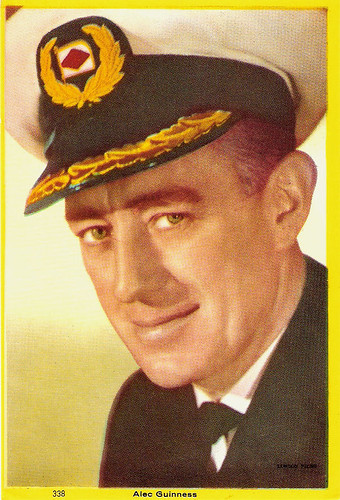
Mexican collector's card, no. 338. Photo: London Films.
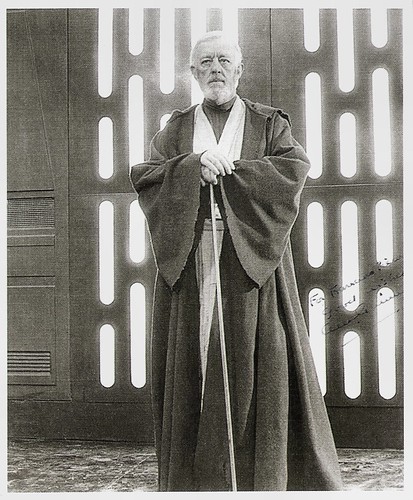
British autograph card. Photo; publicity still for Star Wars (George Lucas, 1977).
Alec Guinness was born as Alec Guinness de Cuffe in London in 1914. His mother's maiden name was Agnes Cuff. On Guinness's birth certificate, the space for the mother's name shows Agnes de Cuffe. The space for the infant's name (where first names only are given) says Alec Guinness. The column for name and surname of the father is blank.
It has been frequently speculated that the actor's father was a member of the Irish Guinness family. However, it was an elder Scottish banker, Andrew Geddes, who paid for Guinness's private school education. From 1875, under English law, when the birth of an illegitimate child was registered, the father's name could only be entered on the certificate if he were present and gave his consent.
At five Alec became Alec Stiven, as a consequence of his mother's three-year marriage to Scottish army captain David Stiven, a violent, shell-shocked veteran of the Irish War of Independence. To persuade Alec's mother to submit to his demands, the captain was given to holding a loaded revolver to the boy's head, or hanging him upside down from a bridge.
It was a relief when, at six, Alec was sent away to a prep school, the fees being at least partly paid by Andrew Geddes. At school he directed performances of The Pirates of Penzance and Silas Marner. Later while working as a junior copywriter in an advertising agency, he studied at the Fay Compton Studio of Dramatic Art.
In 1934, he made his stage debut and in 1936, at the age of 22, he played the role of Osric in John Gielgud's successful production of Hamlet. With the Old Vic he starred in plays by William Shakespeare, George Bernard Shaw, and Anton Chekhov, and worked with actors and actresses who would become his friends and frequent co-stars in the future, including John Gielgud, Peggy Ashcroft, Anthony Quayle, and Jack Hawkins.
In 1938, he starred in a famous modern dress production of Hamlet which won him acclaim on both sides of the Atlantic. He also appeared as Romeo in a production of Romeo and Juliet (1939), as Andrew Aguecheek in Twelfth Night and as Exeter in Henry V in 1937, both opposite Laurence Olivier, and as Ferdinand in The Tempest, opposite Gielgud as Prospero. In 1939, he adapted Charles Dickens' novel Great Expectations for the stage, playing the part of Herbert Pocket. The play was a success.
In World War II, Guinness served in the Royal Navy Volunteer Reserve, first serving as a seaman in 1941 and being commissioned the following year. He commanded a landing craft taking part in the invasion of Sicily and Elba and later ferried supplies to the Yugoslav partisans.
In 1946, he returned to the Old Vic and stayed until 1948, playing Abel Drugger in Ben Jonson's The Alchemist, the Fool in King Lear opposite Laurence Olivier in the title role, DeGuiche in Cyrano de Bergerac opposite Ralph Richardson in the title role, and finally starring in an Old Vic production as Shakespeare's Richard II.
After leaving the Old Vic, he played Eric Birling in J. B. Priestley's An Inspector Calls at the New Theatre in October 1946. He played the Uninvited Guest in the Broadway production of T. S. Eliot's The Cocktail Party (1950, revived at the Edinburgh Festival in 1968). His third attempt at the title role of Hamlet, this time under his own direction at the New Theatre (1951), proved a major theatrical disaster.
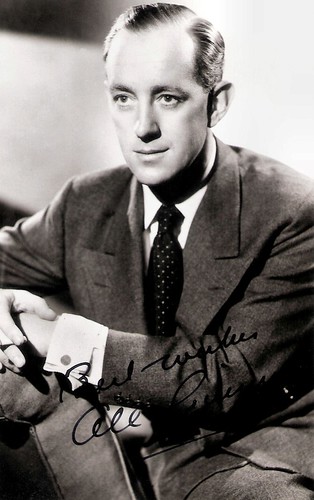
British autograph card.
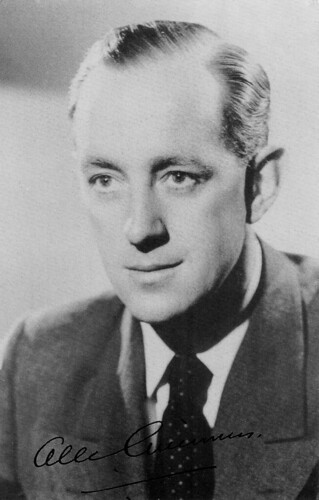
British postcard in the Film Star Autograph Portrait Series by L.D. LTD., London, no. 53.
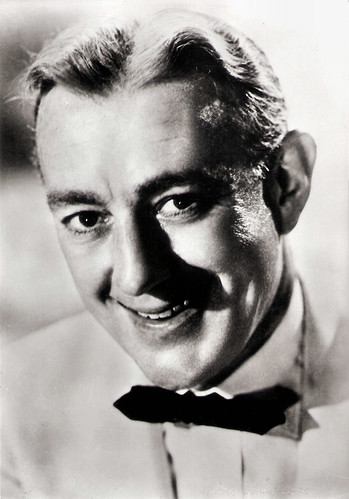
Italian postcard by Alterocca, Terni, no. 49454.
At British Pictures, David Absalom writes: “Alec Guinness was one of the great acting knights of the century. His reputation is sometimes overshadowed by that of the great triumvirate of Olivier, Gielgud and Richardson and it is true that his theatre work is slightly less distinguished than that of the big three, but when it comes to film acting, he far outstrips them.”
Beyond an extra part in Evensong (Victor Saville, 1934) with Evelyn Laye, Guinness’ film career began after World War II with the small but memorable role of Herbert Pocket in Great Expectations (David Lean, 1946) starring John Mills.
Guinness and director David Lean would continue to work on acclaimed films together. Guinness appeared as a repulsive Fagin in Oliver Twist (David Lean, 1948), what was widely criticised for being a Jewish stereotype. Lean later gave him a starring role as the insanely uncompromising Colonel Nicholson opposite William Holden in The Bridge on the River Kwai (David Lean, 1957). For this performance Guinness won an Academy Award.
Despite a difficult and often hostile relationship, Lean, referring to Guinness as ‘my good luck charm’, continued to cast Guinness in character roles in his later films: Arab leader Prince Feisal in Lawrence of Arabia (David Lean, 1962), the title character's half-brother, Bolshevik leader Yevgraf, in Doctor Zhivago (David Lean, 1965), and Indian mystic Godbole in A Passage to India (David Lean, 1984). He was also offered a role in Ryan's Daughter (David Lean, 1970), but declined.
Initially Guinness was associated mainly with the Ealing comedies that made him one of the great character stars of British films. His virtuosity as a master of disguise reached a peak in Kind Hearts and Coronets (Robert Hamer, 1949), when he played all eight members of the D'Ascoyne family whom Dennis Price bumped off on his way to the Dukedom of Chalfont.
Other memorable roles in Ealing classics include the mild and underpaid bank clerk who plots the perfect robbery in The Lavender Hill Mob (Charles Crichton, 1951), an inventor who, to the consternation of management and the unions, invents a fabric that never gets dirty and never wears out in The Man in the White Suit (Alexander Mackendrick, 1951), and the unctuous, snaggle-toothed leader of a gang of incompetent burglars in the last great Ealing Comedy, The Ladykillers (Alexander Mackendrick, 1955).
Director Ronald Neame cast Guinness in his first romantic lead role, opposite Petula Clark in The Card (Ronald Neame, 1952). His conversion to Roman Catholicism followed the shooting of Father Brown (Robert Hamer, 1954) in which he played G.K. Chesterton's cheery parish priest. The film was shot in Burgundy. Between takes Guinness, wandering about the local village in his clerical fig, found himself taken by the hand and subjected to the prattle of a local boy, who imagined he was a genuine priest. The confidence which the Church inspired in the child made a profound impression. Guinness became a Roman Catholic in 1956.
Other notable film roles of this period included the part of the Crown Prince in The Swan (Charles Vidor, 1956) starring Grace Kelly, in her second to last film role, and The Horse's Mouth (Ronald Neame, 1958) in which Guinness played the part of drunken painter Gulley Jimson as well as contributing the screenplay, for which he was nominated for an Academy Award.
He was a vacuum cleaner salesman enlisted into the secret service by Noel Coward in Our Man in Havana (Carol Reed, 1959), Marcus Aurelius in The Fall of the Roman Empire (Anthony Mann, 1964) starring Sophia Loren, Jacob Marley's Ghost in Scrooge (Ronald Neame, 1970) opposite Albert Finney, and Charles I of England in Cromwell (Ken Hughes, 1970) featuring Richard Harris.
He considered the title role in Hitler: The Last Ten Days (Ennio De Concini, 1973) as his best film performance, though critics disagreed. The Telegraph commented in its obituary: “Guinness, having discovered through his usual assiduous research that Hitler was a boring man, unfortunately succeeded brilliantly in bringing this interpretation to the screen.” Guinness won a Tony Award for his Broadway performance as poet Dylan Thomas in Dylan. He next played the title role in Macbeth opposite Simone Signoret at the Royal Court Theatre in 1966, a conspicuous failure.
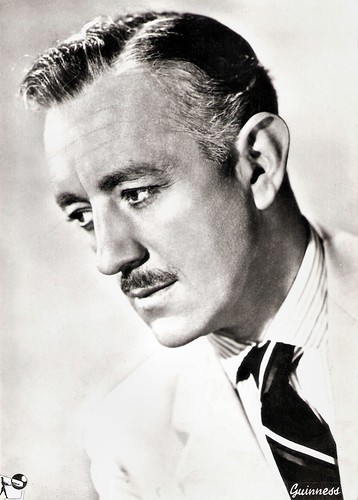
Italian postcard by Bromofoto, Milano (Milan), no. 1291. Photo: Rank. Publicity still for To Paris with Love (Robert Hamer, 1955).
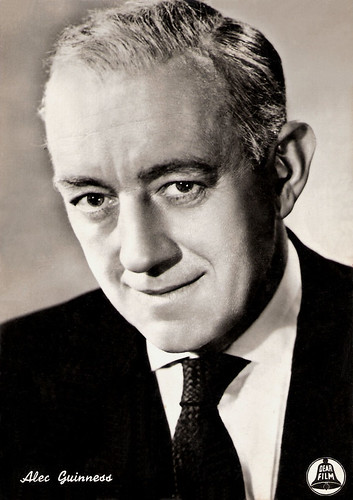
Italian postcard by Bromofoto, Milano (Milan), no. 1500. Photo: Dear Film. Publicity still for The Horse's Mouth (Ronald Neame, 1958).
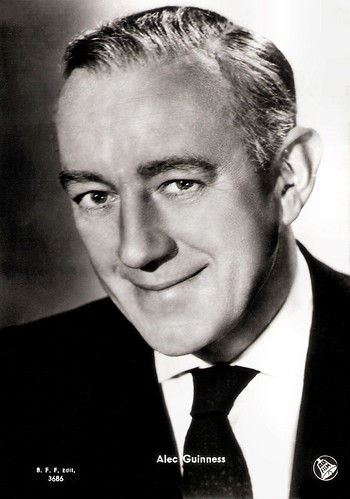
Italian postcard by B.F.F. Edit., no. 3686. Photo: Dear Film. Publicity still for The Horse's Mouth (Ronald Neame, 1958).
From the 1970s, Alec Guinness made regular television appearances. He was perfect as the enigmatic master spy George Smiley in the two television series adapted from John Le Carré's novels, Tinker, Tailor, Soldier, Spy (John Irvin, 1979) and Smiley's People (Simon Langton, 1982). Le Carré was so impressed by Guinness's performance as Smiley that he based his characterisation of Smiley in subsequent novels on Guinness. In the cinema Guinness excelled as Jamessir Bensonmum, the blind butler, in the Neil Simon film Murder By Death (Robert Moore, 1976).
Guinness is now probably best known as Obi-Wan Kenobi in the original Star Wars trilogy, Star Wars: Episode IV - A New Hope (George Lucas, 1977), Star Wars: Episode V - The Empire Strikes Back (Irvin Kershner, 1980), and Star Wars: Episode VI - Return of the Jedi (Richard Marquand, 1983). The part brought him worldwide recognition by a new generation.
Guinness agreed to take the part on the condition that he would not have to do any publicity to promote the film. He was also one of the few cast members who believed that the film would be a box office hit; he negotiated a deal for 2.5 % of the gross, which made him very wealthy in his later life. His role would also result in Golden Globe and Academy Award nominations. Despite these rewards, Guinness soon became unhappy with being identified with the part, and expressed dismay at the fan-following that the Star Wars trilogy attracted.
Guinness received an Academy Honorary Award for lifetime achievement in 1980. In 1988, he got an Academy Award nomination for Best Supporting Actor for Little Dorrit (Christine Edzard, 1988) starring Dereki Jacobi and Joan Greenwood. For his theatre work, he received an Evening Standard Award for his performance as T.E. Lawrence in Ross and a Tony Award for his Broadway turn as Dylan Thomas in Dylan. Guinness was appointed a Commander of the Order of the British Empire (CBE) in 1955, and was knighted in 1959.
Guinness married the artist, playwright, and actress Merula Sylvia Salaman in 1938. In 1940, they had a son, Matthew Guinness, who later became an actor. In his biography, Alec Guinness: The Unknown, Garry O'Connor says that Guinness was arrested and fined 10 guineas for a homosexual act in a public lavatory in Liverpool in 1946. Guinness avoided publicity by giving his name to police and court as 'Herbert Pocket', the name of the character he played in Great Expectations. The incident did not become public knowledge until April 2001, eight months after his death.
Piers Paul Read, Guinness's official biographer, doubts that this incident actually occurred. He believes that Guinness was confused with John Gielgud, who was infamously arrested for such an act around the same period. According to Piers Paul Read, Guinness' friends and family knew of his bisexuality.
Guinness wrote three volumes of a bestselling autobiography, beginning with Blessings in Disguise (1985), followed by My Name Escapes Me (1996), and A Positively Final Appearance (1999). He continued to act almost until his death, submerging himself in an amazing array of characters. His final stage performance was at the Comedy Theatre in 1989 in the play A Walk in the Woods. Between 1934 and 1989, he had played 77 parts in the theatre.
His final film role was a one-scene cameo in the horror thriller Mute Witness (Anthony Waller, 1994) and his last TV role was in the TV-film Eskimo Day (Piers Haggard, 1996).
Alec Guinness died in 2000, from liver cancer, at Midhurst in West Sussex at the age of 86. In his obituary in The Guardian, Tom Sutcliffe calls him ‘a by nature an unostentatious and reserved man’: “Though he undertook a great variety of roles, all were informed, at heart, with the wisdom of the sad clown. It was that spiritual severity, together with those clear, wide-open eyes - capable of melting in close-up on screen into the most reassuringly serene of smiles - which lent his performances force and authenticity.“
Trailer Kind Hearts and Coronets (1949). Source: Film365 (YouTube).
Trailer The Ladykillers (1955). Source: webothlovesoup (YouTube).
Trailer The Bridge on the River Kwai (1957). Source: Sony Pictures Home Entertainment (YouTube).
Trailer Lawrence of Arabia (1962). Source: Cherry Movies (YouTube).
Video trailer Star Wars: Episode IV - A New Hope (1977). Source: Video Detective (YouTube).
Sources: Brian McFarlane (Encyclopedia of British Cinema), Tom Sutcliffe (The Guardian), David Absalom (British Pictures), Ed Stephan (IMDb), The Telegraph, BritMovie, Wikipedia, and IMDb.

German postcard by Franz Josef Rüdel, Filmpostkartenverlag, Hamburg-Bergedorf, no. D 2367. Photos: J. Arthur Rank-Film. Publicity stills for The Ladykillers (Alexander Mackendrick, 1955).

Mexican collector's card, no. 338. Photo: London Films.

British autograph card. Photo; publicity still for Star Wars (George Lucas, 1977).
Violent, shell-shocked veteran
Alec Guinness was born as Alec Guinness de Cuffe in London in 1914. His mother's maiden name was Agnes Cuff. On Guinness's birth certificate, the space for the mother's name shows Agnes de Cuffe. The space for the infant's name (where first names only are given) says Alec Guinness. The column for name and surname of the father is blank.
It has been frequently speculated that the actor's father was a member of the Irish Guinness family. However, it was an elder Scottish banker, Andrew Geddes, who paid for Guinness's private school education. From 1875, under English law, when the birth of an illegitimate child was registered, the father's name could only be entered on the certificate if he were present and gave his consent.
At five Alec became Alec Stiven, as a consequence of his mother's three-year marriage to Scottish army captain David Stiven, a violent, shell-shocked veteran of the Irish War of Independence. To persuade Alec's mother to submit to his demands, the captain was given to holding a loaded revolver to the boy's head, or hanging him upside down from a bridge.
It was a relief when, at six, Alec was sent away to a prep school, the fees being at least partly paid by Andrew Geddes. At school he directed performances of The Pirates of Penzance and Silas Marner. Later while working as a junior copywriter in an advertising agency, he studied at the Fay Compton Studio of Dramatic Art.
In 1934, he made his stage debut and in 1936, at the age of 22, he played the role of Osric in John Gielgud's successful production of Hamlet. With the Old Vic he starred in plays by William Shakespeare, George Bernard Shaw, and Anton Chekhov, and worked with actors and actresses who would become his friends and frequent co-stars in the future, including John Gielgud, Peggy Ashcroft, Anthony Quayle, and Jack Hawkins.
In 1938, he starred in a famous modern dress production of Hamlet which won him acclaim on both sides of the Atlantic. He also appeared as Romeo in a production of Romeo and Juliet (1939), as Andrew Aguecheek in Twelfth Night and as Exeter in Henry V in 1937, both opposite Laurence Olivier, and as Ferdinand in The Tempest, opposite Gielgud as Prospero. In 1939, he adapted Charles Dickens' novel Great Expectations for the stage, playing the part of Herbert Pocket. The play was a success.
In World War II, Guinness served in the Royal Navy Volunteer Reserve, first serving as a seaman in 1941 and being commissioned the following year. He commanded a landing craft taking part in the invasion of Sicily and Elba and later ferried supplies to the Yugoslav partisans.
In 1946, he returned to the Old Vic and stayed until 1948, playing Abel Drugger in Ben Jonson's The Alchemist, the Fool in King Lear opposite Laurence Olivier in the title role, DeGuiche in Cyrano de Bergerac opposite Ralph Richardson in the title role, and finally starring in an Old Vic production as Shakespeare's Richard II.
After leaving the Old Vic, he played Eric Birling in J. B. Priestley's An Inspector Calls at the New Theatre in October 1946. He played the Uninvited Guest in the Broadway production of T. S. Eliot's The Cocktail Party (1950, revived at the Edinburgh Festival in 1968). His third attempt at the title role of Hamlet, this time under his own direction at the New Theatre (1951), proved a major theatrical disaster.

British autograph card.

British postcard in the Film Star Autograph Portrait Series by L.D. LTD., London, no. 53.

Italian postcard by Alterocca, Terni, no. 49454.
One of the great acting knights of the century
At British Pictures, David Absalom writes: “Alec Guinness was one of the great acting knights of the century. His reputation is sometimes overshadowed by that of the great triumvirate of Olivier, Gielgud and Richardson and it is true that his theatre work is slightly less distinguished than that of the big three, but when it comes to film acting, he far outstrips them.”
Beyond an extra part in Evensong (Victor Saville, 1934) with Evelyn Laye, Guinness’ film career began after World War II with the small but memorable role of Herbert Pocket in Great Expectations (David Lean, 1946) starring John Mills.
Guinness and director David Lean would continue to work on acclaimed films together. Guinness appeared as a repulsive Fagin in Oliver Twist (David Lean, 1948), what was widely criticised for being a Jewish stereotype. Lean later gave him a starring role as the insanely uncompromising Colonel Nicholson opposite William Holden in The Bridge on the River Kwai (David Lean, 1957). For this performance Guinness won an Academy Award.
Despite a difficult and often hostile relationship, Lean, referring to Guinness as ‘my good luck charm’, continued to cast Guinness in character roles in his later films: Arab leader Prince Feisal in Lawrence of Arabia (David Lean, 1962), the title character's half-brother, Bolshevik leader Yevgraf, in Doctor Zhivago (David Lean, 1965), and Indian mystic Godbole in A Passage to India (David Lean, 1984). He was also offered a role in Ryan's Daughter (David Lean, 1970), but declined.
Initially Guinness was associated mainly with the Ealing comedies that made him one of the great character stars of British films. His virtuosity as a master of disguise reached a peak in Kind Hearts and Coronets (Robert Hamer, 1949), when he played all eight members of the D'Ascoyne family whom Dennis Price bumped off on his way to the Dukedom of Chalfont.
Other memorable roles in Ealing classics include the mild and underpaid bank clerk who plots the perfect robbery in The Lavender Hill Mob (Charles Crichton, 1951), an inventor who, to the consternation of management and the unions, invents a fabric that never gets dirty and never wears out in The Man in the White Suit (Alexander Mackendrick, 1951), and the unctuous, snaggle-toothed leader of a gang of incompetent burglars in the last great Ealing Comedy, The Ladykillers (Alexander Mackendrick, 1955).
Director Ronald Neame cast Guinness in his first romantic lead role, opposite Petula Clark in The Card (Ronald Neame, 1952). His conversion to Roman Catholicism followed the shooting of Father Brown (Robert Hamer, 1954) in which he played G.K. Chesterton's cheery parish priest. The film was shot in Burgundy. Between takes Guinness, wandering about the local village in his clerical fig, found himself taken by the hand and subjected to the prattle of a local boy, who imagined he was a genuine priest. The confidence which the Church inspired in the child made a profound impression. Guinness became a Roman Catholic in 1956.
Other notable film roles of this period included the part of the Crown Prince in The Swan (Charles Vidor, 1956) starring Grace Kelly, in her second to last film role, and The Horse's Mouth (Ronald Neame, 1958) in which Guinness played the part of drunken painter Gulley Jimson as well as contributing the screenplay, for which he was nominated for an Academy Award.
He was a vacuum cleaner salesman enlisted into the secret service by Noel Coward in Our Man in Havana (Carol Reed, 1959), Marcus Aurelius in The Fall of the Roman Empire (Anthony Mann, 1964) starring Sophia Loren, Jacob Marley's Ghost in Scrooge (Ronald Neame, 1970) opposite Albert Finney, and Charles I of England in Cromwell (Ken Hughes, 1970) featuring Richard Harris.
He considered the title role in Hitler: The Last Ten Days (Ennio De Concini, 1973) as his best film performance, though critics disagreed. The Telegraph commented in its obituary: “Guinness, having discovered through his usual assiduous research that Hitler was a boring man, unfortunately succeeded brilliantly in bringing this interpretation to the screen.” Guinness won a Tony Award for his Broadway performance as poet Dylan Thomas in Dylan. He next played the title role in Macbeth opposite Simone Signoret at the Royal Court Theatre in 1966, a conspicuous failure.

Italian postcard by Bromofoto, Milano (Milan), no. 1291. Photo: Rank. Publicity still for To Paris with Love (Robert Hamer, 1955).

Italian postcard by Bromofoto, Milano (Milan), no. 1500. Photo: Dear Film. Publicity still for The Horse's Mouth (Ronald Neame, 1958).

Italian postcard by B.F.F. Edit., no. 3686. Photo: Dear Film. Publicity still for The Horse's Mouth (Ronald Neame, 1958).
Enigmatic Master Spy
From the 1970s, Alec Guinness made regular television appearances. He was perfect as the enigmatic master spy George Smiley in the two television series adapted from John Le Carré's novels, Tinker, Tailor, Soldier, Spy (John Irvin, 1979) and Smiley's People (Simon Langton, 1982). Le Carré was so impressed by Guinness's performance as Smiley that he based his characterisation of Smiley in subsequent novels on Guinness. In the cinema Guinness excelled as Jamessir Bensonmum, the blind butler, in the Neil Simon film Murder By Death (Robert Moore, 1976).
Guinness is now probably best known as Obi-Wan Kenobi in the original Star Wars trilogy, Star Wars: Episode IV - A New Hope (George Lucas, 1977), Star Wars: Episode V - The Empire Strikes Back (Irvin Kershner, 1980), and Star Wars: Episode VI - Return of the Jedi (Richard Marquand, 1983). The part brought him worldwide recognition by a new generation.
Guinness agreed to take the part on the condition that he would not have to do any publicity to promote the film. He was also one of the few cast members who believed that the film would be a box office hit; he negotiated a deal for 2.5 % of the gross, which made him very wealthy in his later life. His role would also result in Golden Globe and Academy Award nominations. Despite these rewards, Guinness soon became unhappy with being identified with the part, and expressed dismay at the fan-following that the Star Wars trilogy attracted.
Guinness received an Academy Honorary Award for lifetime achievement in 1980. In 1988, he got an Academy Award nomination for Best Supporting Actor for Little Dorrit (Christine Edzard, 1988) starring Dereki Jacobi and Joan Greenwood. For his theatre work, he received an Evening Standard Award for his performance as T.E. Lawrence in Ross and a Tony Award for his Broadway turn as Dylan Thomas in Dylan. Guinness was appointed a Commander of the Order of the British Empire (CBE) in 1955, and was knighted in 1959.
Guinness married the artist, playwright, and actress Merula Sylvia Salaman in 1938. In 1940, they had a son, Matthew Guinness, who later became an actor. In his biography, Alec Guinness: The Unknown, Garry O'Connor says that Guinness was arrested and fined 10 guineas for a homosexual act in a public lavatory in Liverpool in 1946. Guinness avoided publicity by giving his name to police and court as 'Herbert Pocket', the name of the character he played in Great Expectations. The incident did not become public knowledge until April 2001, eight months after his death.
Piers Paul Read, Guinness's official biographer, doubts that this incident actually occurred. He believes that Guinness was confused with John Gielgud, who was infamously arrested for such an act around the same period. According to Piers Paul Read, Guinness' friends and family knew of his bisexuality.
Guinness wrote three volumes of a bestselling autobiography, beginning with Blessings in Disguise (1985), followed by My Name Escapes Me (1996), and A Positively Final Appearance (1999). He continued to act almost until his death, submerging himself in an amazing array of characters. His final stage performance was at the Comedy Theatre in 1989 in the play A Walk in the Woods. Between 1934 and 1989, he had played 77 parts in the theatre.
His final film role was a one-scene cameo in the horror thriller Mute Witness (Anthony Waller, 1994) and his last TV role was in the TV-film Eskimo Day (Piers Haggard, 1996).
Alec Guinness died in 2000, from liver cancer, at Midhurst in West Sussex at the age of 86. In his obituary in The Guardian, Tom Sutcliffe calls him ‘a by nature an unostentatious and reserved man’: “Though he undertook a great variety of roles, all were informed, at heart, with the wisdom of the sad clown. It was that spiritual severity, together with those clear, wide-open eyes - capable of melting in close-up on screen into the most reassuringly serene of smiles - which lent his performances force and authenticity.“
Trailer Kind Hearts and Coronets (1949). Source: Film365 (YouTube).
Trailer The Ladykillers (1955). Source: webothlovesoup (YouTube).
Trailer The Bridge on the River Kwai (1957). Source: Sony Pictures Home Entertainment (YouTube).
Trailer Lawrence of Arabia (1962). Source: Cherry Movies (YouTube).
Video trailer Star Wars: Episode IV - A New Hope (1977). Source: Video Detective (YouTube).
Sources: Brian McFarlane (Encyclopedia of British Cinema), Tom Sutcliffe (The Guardian), David Absalom (British Pictures), Ed Stephan (IMDb), The Telegraph, BritMovie, Wikipedia, and IMDb.
No comments:
Post a Comment